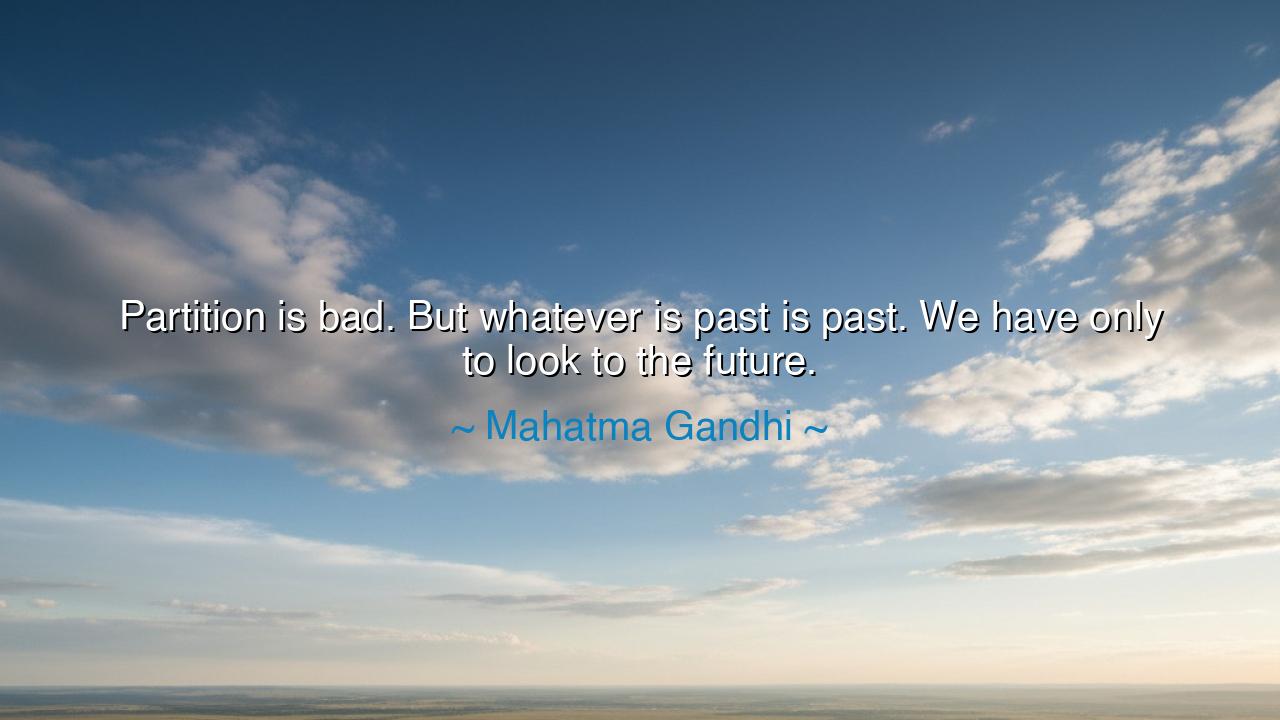
Partition is bad. But whatever is past is past. We have only to






“Partition is bad. But whatever is past is past. We have only to look to the future.” – Mahatma Gandhi
Hear these words, O seeker of peace, and feel the quiet strength that flows from the heart of Mahatma Gandhi, the father of India’s conscience. In this humble yet mighty saying, he speaks not as a politician, but as a healer of souls. When he declared, “Partition is bad,” he did not deny the sorrow that tore through his people when the land was divided, families separated, and rivers of blood ran through the streets. But in the next breath, he uttered words of renewal—“whatever is past is past. We have only to look to the future.” This was not forgetfulness, but forgiveness; not dismissal, but transcendence. He taught that clinging to pain imprisons the heart, while looking toward the future frees the spirit to rebuild.
In 1947, the world watched as the great jewel of the East—India—was split into two nations: India and Pakistan. The wound was deep, and the cries of division echoed through every village and home. Gandhi’s own soul trembled at the sight of violence committed in the name of faith and flag. Yet even amidst such ruin, he refused to surrender to hatred. Instead, he called upon his people to rise above vengeance, to see in their neighbor not an enemy but a reflection of their own suffering. For Partition may have divided land, but he knew that if hearts remained divided, the nation would never heal. His words were an appeal to the eternal truth: that no greatness is born from bitterness.
Gandhi’s wisdom is not confined to his time. In every age, humanity faces its own partitions—between races, beliefs, and ideologies. The walls we build in anger become prisons that hold generations captive. But Gandhi teaches that whatever is past is past; it is not the past that defines us, but the way we rise from it. To look toward the future is to reclaim power from pain, to declare that hope will not be extinguished by grief. His teaching is a call to the courage of renewal, the discipline of peace, and the faith that light can emerge even from the darkest hour.
Think of Nelson Mandela, who spent twenty-seven years in captivity under apartheid. When at last he walked free, he faced a nation steeped in resentment and fear. He could have called for retribution, but instead he followed the path Gandhi had once walked—he forgave. He said, “Resentment is like drinking poison and hoping it will kill your enemies.” Mandela, like Gandhi, looked to the future, choosing reconciliation over revenge. In doing so, he transformed his nation and reminded the world that true leadership lies not in domination, but in compassion.
The ancients would say that to look to the future is to honor life itself. The past, though filled with lessons, is a river that has already flowed; one cannot step into it again. But the future is the open sea, wide and full of possibility. Gandhi’s message invites each of us to steer our vessel not toward the wreckage behind, but toward the horizon ahead. For even the deepest wound, when faced with love and patience, can become the birthplace of strength.
O listener, remember this teaching: grief is natural, but despair is a choice. The wise acknowledge pain, then release it. To dwell on what has been lost is to lose what remains. Whether in the life of a person or a nation, healing begins when we stop asking “why did this happen?” and begin asking “what can we build now?” Gandhi’s vision was not of denial, but of purpose—of turning sorrow into service, and division into unity.
Let us, then, live by this eternal truth: the past cannot be changed, but the future can be shaped. When you face betrayal, disappointment, or separation, do not dwell upon the ashes—use them to kindle the fire of rebirth. Forgive where it is hard, and rebuild where it seems impossible. For in every ending lies the seed of beginning, and in every wound, the possibility of wisdom.
Thus spoke Mahatma Gandhi, the silent thunder of peace: “Partition is bad. But whatever is past is past. We have only to look to the future.” And so must we—each day, each moment—choose to look forward, not with blindness to the pain behind us, but with faith that what lies ahead is worth the journey. For only those who walk toward the light can leave the shadows behind.






AAdministratorAdministrator
Welcome, honored guests. Please leave a comment, we will respond soon